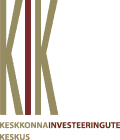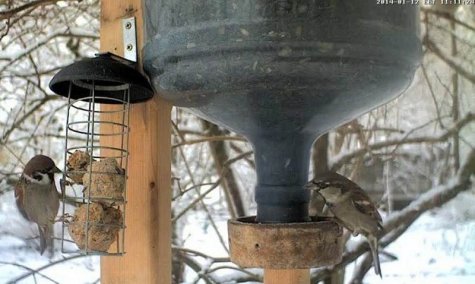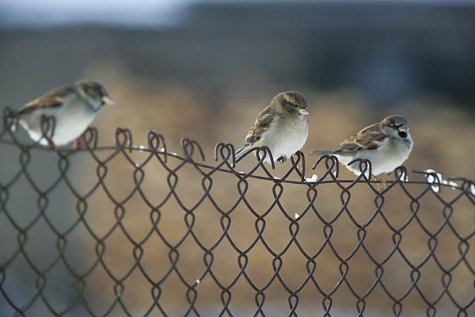Winter bird feeder webcam – House sparrow
Web camera image captured by Aita, LK forum
Photo Arne Ader
Translation Liis
Tree sparrow and house sparrow
House sparrow Koduvarblane Passer domesticus
In the last 50 years the number of house sparrows has decreased significantly. There should be maybe a couple of hundred thousand of the very sedentary birds in cities and villages in winter. They are up to some tens of grams heavier than tree sparrows with whom they often keep company in winter. It is even visible – weight more than 30 grams, sturdy-looking, and their larger beak catches attention.
The plumage of male birds is a little brighter, back maroon patterned in yellow and black. The females have a duller back plumage: patterned in grey, black, beige. Both have a white wing band and back lengthwise bands on the brownish wings. Underparts ”sparrow grey”, legs light brown. Eye iris reddish brown, the eyebrow streak of females yellowish, the beak colour of both sexes similar in winter.
The crown of the head and cheeks of the house sparrow male are grey, the chin patch black – females don’t have it. The plumage of the female leaves a pale brown impression, with not particularly contrasting bands. Some individuals that spend the night in chimneys look like ”soot ghosts”, our plumage description does not hold for them.
The behaviour of the ”street urchins” fits the name – noticeably careless, they arrive as a gang, wreak havoc among the other passerines, bird food flies in all directions and they are gone ... They can stand up for their ”rights”: they are fast, brazen, noisy, fearless in face of bigger birds.
Sparrows are not early birds, in daytime they happily skip about under the birdfeeder looking for spilled seeds. They can stand up for their rights, they are quick, brazen, noisy, unafraid of bigger ones – necessary qualities for staying alive in a market economy.
House sparrow: LINK
House sparrow on fence










